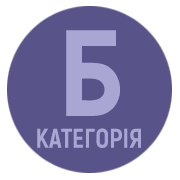FORMATION OF THE CULTURE OF WORK OF FUTURE TEACHERS OF THE UKRAINIAN LANGUAGE AND LITERATURE WITH THE INTERNET TEXT
DOI:
https://doi.org/10.32782/philspu/2024.5.10Keywords:
Internet text, language and methodological training, formation, future teacher of Ukrainian language and literature, culture of working with Internet text, content and methodological support, teaching Ukrainian in high schoolAbstract
The article outlines the content and methodological support for forming a culture of working with Internet text in teaching methods of the Ukrainian language. In order to determine the methodological peculiarities of working with the Internet text of future Ukrainian language and literature teachers, the definitional features of the genre and the thematic specificity of the Internet text as a kind of media text are clarified. Based on the analysis of scientific sources and the research work carried out, the key concepts of the study are outlined. The specific features of the Internet text include relevance, interactivity, and hypertextuality. During the study, the emphasis was placed on working with informational speech genres such as blogs and forums, which are most suitable for the methodological training of future teachers to work with Internet texts. Forums and blogs are presented as specific genres of Internet discourse, with an original selection of stylistic means of speech and compliance with the characteristics of online text. A forum is more focused on a specific topic of discussion that can be returned to, while a blog is a constant change of short informational messages, the updates the reader can observe by logging in. As a speech genre of online communication, forums are characterized by interaction: fact-message-discussion, interactive nature of communication, and unlimited time. We define the keyword “culture of working with Internet text” as the psychological prerequisites for perceiving, understanding, and mastering various types of analysis of Internet text and its compilation. The pedagogical partnership of the organizations in which the authors of the article work prompted us to develop exercises and tasks based on materials from regional forums and blogs that best match the characteristics of online text, have rapid dynamics of diversification and allow for a wide selection of thematic panels. In order to form the culture of future teachers’ work with online texts, exercises for the seventh grade according to the New Ukrainian School program were developed and tested as part of the methodology of teaching the Ukrainian language. In contrast, testing the developed exercises on the basis of senior classes of general secondary education institutions in Sumy and Chernihiv allowed us to clarify the groups of skills future teachers need to form a culture of work with online texts. The research prospect is to conduct a multifactorial analysis of the influence of the Internet environment on the formation of youth’s linguistic identity.
References
Digital Global Overview Report 2023. URL: https://datareportal.com/reports/digital-2023-global-overview-report.
Державний стандарт базової середньої освіти (2020). URL: https://www.kmu.gov.ua/npas/pro-deyaki-pitannyaderzhavnih-standartiv-povnoyi-zagalnoyi-serednoyi-osviti-i300920-898?fbclid=IwAR2L6wsCGLa8K7qlzeTItm3FiSQKtO7lKMsJ2e6bZ20jLqQyERgcEKrg0cI.
Модельна навчальна програма «Українська мова. 7–9 класи» для закладів загальної середньої освіти / Н. Б. Голуб, О. М. = Горошкіна. Рекомендовано Міністерством освіти та науки України. Наказ № 883 від 24.07.2023. URL: https://mon.gov.ua/ua/osvita/zagalna-serednya-osvita/navchalni-programi/modelni-navchalni-programi-dlya-5-9-klasiv-novoyi-ukrayinskoyi-shkoli-zaprovadzhuyutsya-poetapno-z-2022-roku.
Drushlyak M.G., Semenog O.M., Budianskyi D.V., Sotska H.I., Trynus O.V., Semenikhina O.V. The Use of Digital Technologies for the Development of Pre-service Teachers’ Rhetorical Skills: The Experience of Ukraine. 45th Jubilee International ICT Convention – MIPRO 2022. May 23–27. URL: https://ieeexplore.ieee.org/document/9803713 (дата звернення 16.02. 2024).
Друшляк М.Г., Семеног О.М., Грона Н.В., Пономаренко Н.П., Семеніхіна О.В. Типологія інтернет-ресурсів для розвитку інфомедійної грамотності молоді. Інформаційні технології та засоби навчання, 2022. Том 88, № 2. С. 1–22.
Семеног О., Плужник Ю. Фахово-методична підготовка майбутніх учителів до формування читацької грамотності учнів на засадах дослідження PISA-2018. Слобожанський науковий вісник. Серія: Філологія. 2023. Вип. 3. С. 150–162.
Bell A. The Language of News Media. Oxford: Blackwell, 1991. 277 p.
Dijk, Teun A. van. Discourse and Communication: New Approaches to the Analysis of Mass Media Discourse and Communication, Berlin, New York: De Gruyter, 1985. URL: https://doi.org/10.1515/9783110852141.
Крейг Р. Інтернет-журналістика: робота журналіста і редактора у нових ЗМІ. Київ : Видавничий дім «Києво-Могилянська академія», 2007. 324 с.
Гудзь Н. О. Інтернет-дискурс як новий тип комунікації: структура, мовне оформлення, жанрові формати. Сучасні лінгвістичні студії : навчальний посібник. Житомир : Вид-во ЖДУ ім. І. Франка, 2015. С. 61–87.
Шкворченко Н. Інтернет-дискурс як лінгвістична категорія. Актуальні питання гуманітарних наук. Міжвузівський збірник наукових праць молодих вчених Дрогобицького державного педагогічного університету імені Івана Франка, 2019. Вип. 23. Том 3. С. 62–68.
Яцимірська М., Драган Н. Медіатекст як продукт журналістської творчості (психолінгвістичний аналіз логічного сприйняття та емоцій). Вісник Львівського університету. Серія: Журналістика. Львів, 2007. Вип. 30. С. 267–276.
Ільганаєва В. О. Інформація та знання в соціально-комунікаційних процесах. Освіта регіону. Політологія, психологія, комунікації. 2009. № 2. С. 149–153.
Бобаль Н. Р. Тексти ЗМІ: структура та зміст поняття. Наукові записки Націольнального університету «Острозька академія». Серія: Філологічна. 2012. № 30. С. 234–235.
Лалл Джеймс. Мас-медіа, комунікація, культура: глобальний підхід [Текст] /пер. О. Гриценко [та ін.] ; ред. О. Г. Гриценко. Київ : К.І.С., 2002. 264 с.
Мовленнєві жанри на уроках української мови в ліцеї (рівень стандарту) : практичний посібник. Голуб Н. Б., Новосьолова В. І., Гадаєвська Л. В. Київ : КОНВІ ПРІНТ, 2020. 128 с.
Різун В. В. Літературне редагування: підручник. Київ : Либідь, 1996. 240 с.
Авраменко О. М. Українська мова (рівень стандарту) : підручник для 11 класу закладів загальної середньої освіти. Київ : Грамота, 2019. 208 с.
Семеног О. М., Калинич О., Дятленко Т.І., Білясник М.Д., Гапон Л. Українська мова: підручник для 7 класу закладів загальної середньої освіти. Тернопіль : Астон, 2024. URL: https://lib.imzo.gov.ua/konkursniyvdbr-pdruchnikv-dlya-7-klasu/movno-lteraturna-osvtnya-galuz/ukranska-mova/ukranska-mova-pdruchnik-dlya-7-klasuzakladv-zagalno-seredno-osvti-avt-semenog-o-m-kalinich-o-v-dyatlenko-t--blyasnik-m-d-gapon-l-o/.







